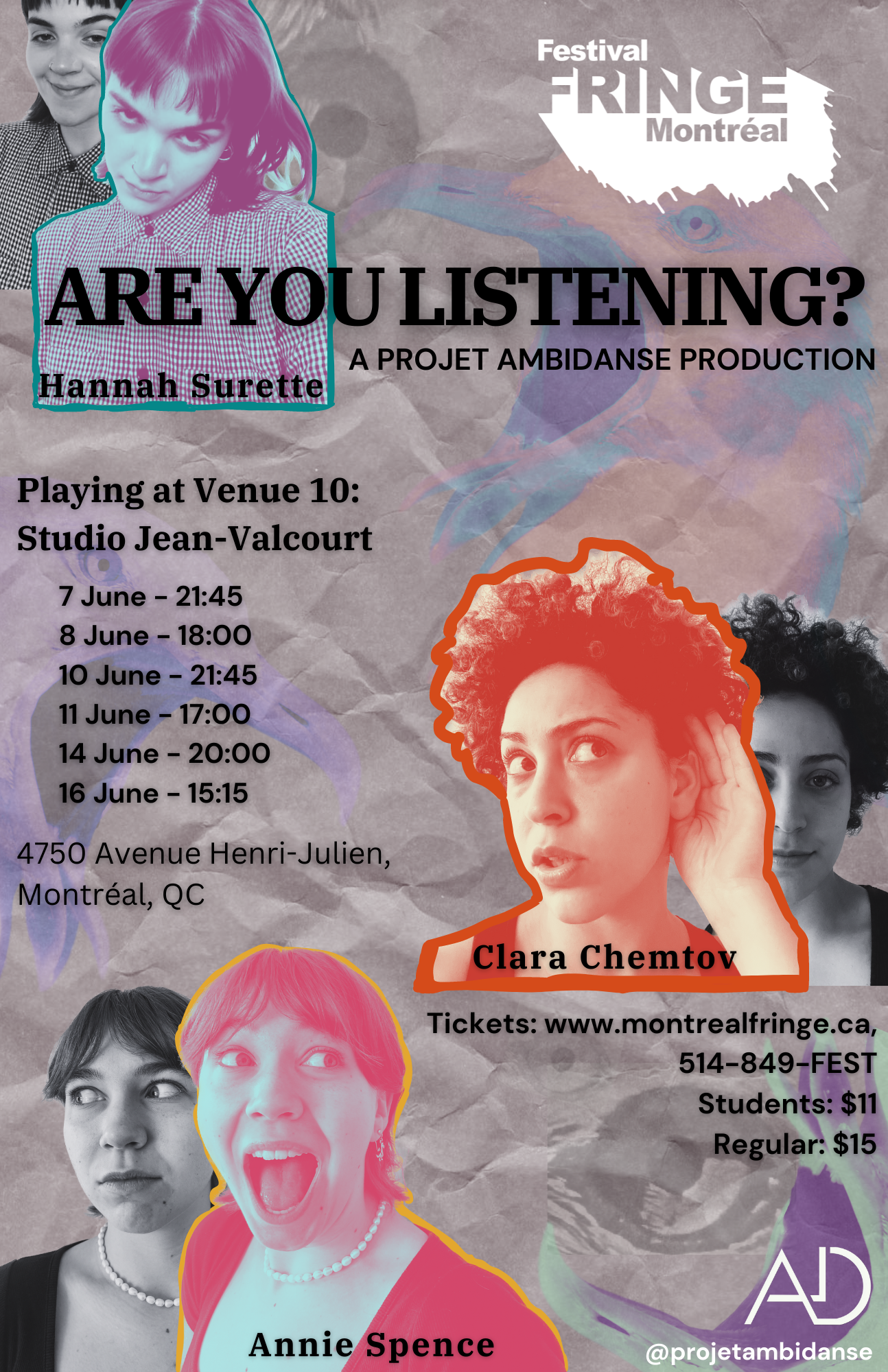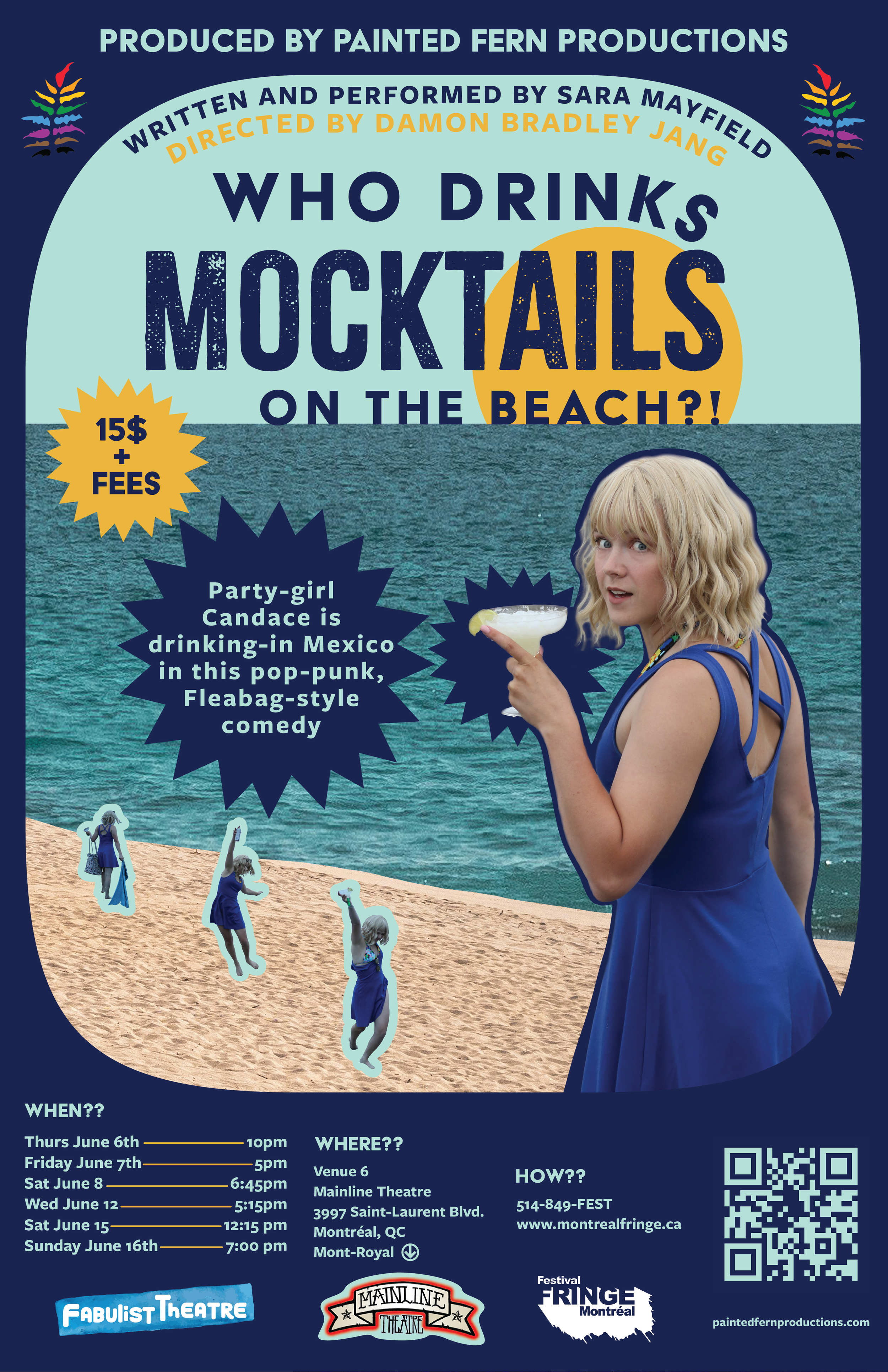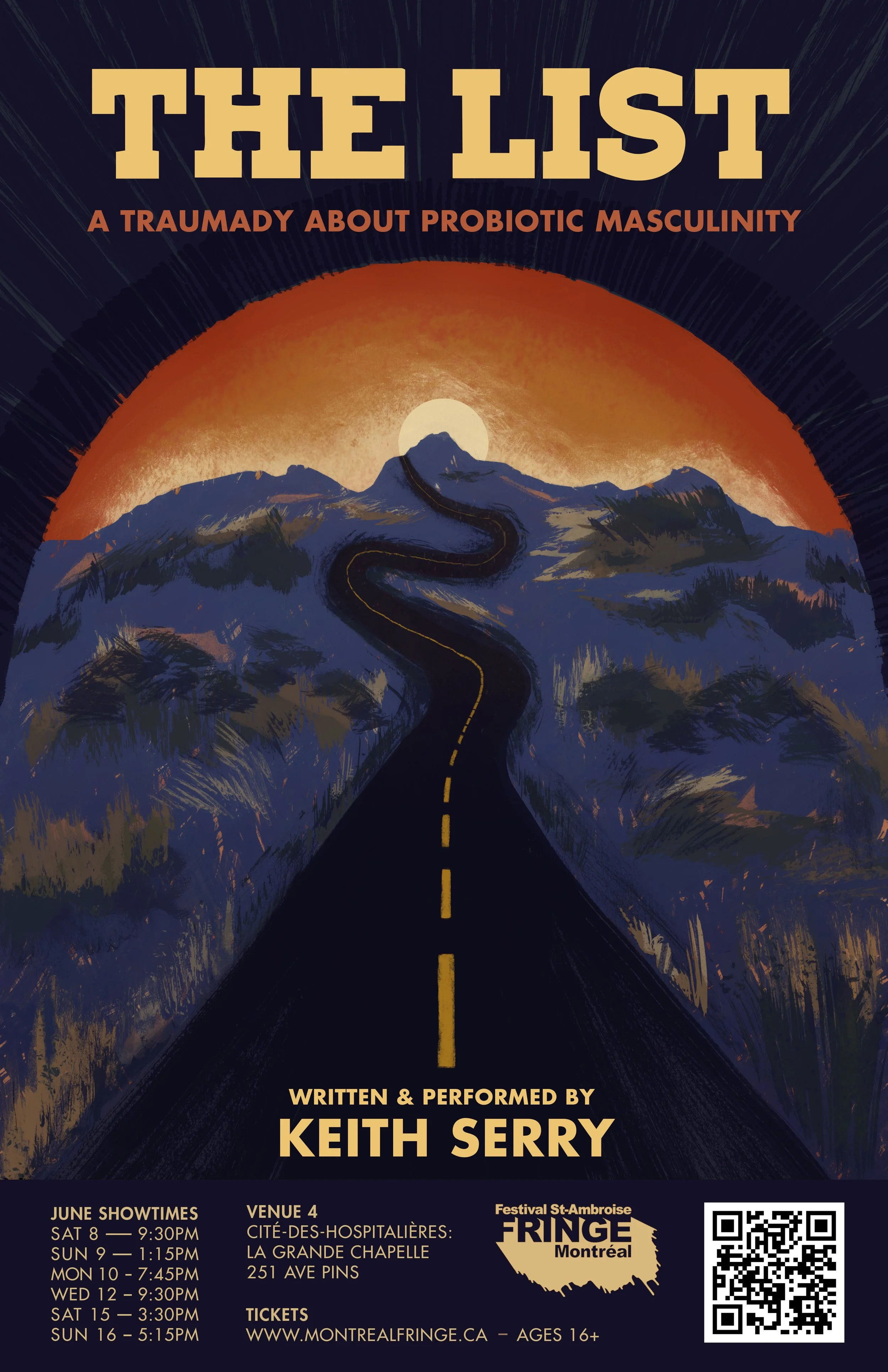Tara’s Reviews
Are You Listening?
Are You Listening? is a contemporary dance piece which names, deconstructs, and questions conventions of conversation in the society in which it’s situated. It’s running at Studio Jean-Valcourt at the Conservatoire de musique et d’art dramatique through June 16th.
I married this painter once, who told me that language is the ultimate abstraction. It’s my relationships with artists of other mediums that has led me to accept how correct he was. If art’s always a means of expressing something true, then the immediate understanding you get when you’re struck by a painting, or a symphony, is always going to be more literal and effective than the attempt to solidify the ineffable into language.
Following this logic, Are You Listening? is absolutely a dance piece. Words are not really the point of the whole thing — they appear in the work mostly to demonstrate their shortcomings. Sometimes I wonder if words — and talking, specifically — are best understood like a little marriage between dance and music, both of which strike me, now that I’ve spent decades becoming a writer like an idiot, as better ways of expressing things. The movement language of the dancer-choreographers in Are You Listening? communicate better than any spoken language could, especially to question communication the way it does. Annie Spence has a palpable spark, even while completely still, that ignites the others, setting off the differences between each of the dancers and giving the work scope and depth. Hannah Surette’s movement is understated, linear, and contains a sense of humour and a mature sexuality where each component fundamentally supports the other. Clara Chemtov moves in a way that is elegantly masculine, with a twitchy confidence and grace that is very difficult to look away from.
The tech is the best I’ve seen in the festival so far: I heard and saw everything I was supposed to hear, and see, and no one aspect was overpowered or canceled out by any others.
I think that the points that Are You Listening? makes about communication are most effective when they’re immediately readable, and especially to non-dancers, which I don’t think they always are. There are shining moments of clarity and brilliance, and a great many aspects of the work I had to come away and think about for a long time — which, to be fair, may have been the point. As a poet, I have spoken to dancers about a kind of mutual frustration that dance and poetry are both sometimes thought about like they’re a riddle that you need to solve, or you won’t get it, instead of the pure communication capacities afforded to a wash of colour, or a chord change. I’d hate to do dancers this disservice. Go see this show. People move on a stage. It is beautiful.
Who Drinks Mocktails On The Beach?!
Who Drinks Mocktails On The Beach?! is a fun romp through one Vancouver good-time girl’s Mexican beach-set realization that she may, in fact, be an alcoholic. The show takes place at the Mainline – our city’s premiere gnarly little performance space, which is still open by the grace of our deeply weird and committed DIY arts scene and the strange mercies of a chaotic God. As a one-woman show, the production benefits from an extremely sparse set design (one wooden chair and the contents of the main character’s purse) and a throwback top-40 bubblegum pop-punk soundtrack that says as much about the character as the script does.
Our protagonist, Candace, embodies the AA slogan that addiction is a social disease: the result of not saying what one means and not meaning what one says, of engaging in a thousand little self-betrayals that promise, in the addict’s unexamined internal folk logic, to bring us closer to people, but denies the vulnerability which is a precondition for intimacy. Candace is good at making friends. Candace has an edge she can only give public purchase in ways that are socially acceptable — see bubblegum pop-punk, above — while she unilaterally rejects the actual darkness of her life: her regrets, her impulsiveness, her profound and enduring loneliness. These, to her, are the biggest threats to relationships — when they are, in fact, where she most needs love, community, and acceptance.
The performance I saw played the music so loudly that some of writer-performer Sara Mayfield’s delivery was eaten up by some cacophonous three-chord power-ballad or another. This was the only time I really resented the soundtrack, which was mostly of songs I can admit that I like, despite the damage that confession may do to my punk reputation, for reasons that have something to do with the lessons about authentic self-expression I learned in four years of sobriety. I found Candace annoying, at first — she was billed as some kind of Fleabag character, but my internal Fleabag character immediately dismissed her as someone whose complexities and edgy sensibilities are more neoliberal personal branding than anything else. But this was shoved directly in my face as Sarah Mayfield’s performance brought me all the way through to sincere compassion and sympathy as Candace reveals herself to be a poster-girl for a certain kind of high-functioning female alcoholic: the girl whose addiction might bring her punctuated moments of acute shame, but who is mostly just stuck in a prolonged and perpetual adolescence while she uses alcohol to avoid things, and to lubricate herself into a kind of life she might not even like, or want, if she wasn’t drinking. And then, of course, she wonders why she’s so lonely all the time. I don’t think the work breaks new ground, or is willing to raise the stakes high enough to get itself to the artistic or emotional level it could — but it’s a sincere and touching adventure about a common and insidious manifestation of substance use disorder, and absolutely worth the 55 minute run time.
Admiring Librarians
Admiring Librarians is a stand-up comedy set by Raquel Maestre, which is largely about her experience coming out as a trans lesbian, but which is also about other things, like being a nerd. At the very cool and swanky-seeming O PATRO VYS, which I mostly remember as a place I downed two absinthe cocktails at a staff party in undergrad and then immediately blacked out, the night starts with two shorter stand-up sets from Lauren Mallory and Ellie Gill. The talented openers set the tone for the evening, and this tone is awesome.
Queer comedy, as a concept, makes me nervous. Not because I’m some kind of homophobe, but because I am queer myself, and having lived my adult life in queer spaces I have come to the conclusion that many of us have suffered profoundly in a way that lends itself to us taking ourselves too seriously — and, what’s more — demand other people also take us seriously, in ways that are often inappropriate for the intimacy level of a given interaction, and very annoying, and not very funny. I have sat through so much bad queer comedy. Imagine my delight, then, to discover that this show was good.
The openers delivered their sets in ways that were raw and slightly unpolished, but I do not mean this in a bad way at all — the quality made it seem organic, open to the flow of energy in the room, and generally made me feel like I was sitting in a living room with very funny friends.
Raquel Maestre is smart, vulnerable, and not afraid to laugh at the aspects of queerness which are obviously very funny. While the piece is vulnerable, it is not nauseatingly saccharine (which, sorry, lots of queer comedy is). The intimacy we feel with her is genuine, and she displays chameleon-like relatability as she cycles through stories about male socialization, the wannabe artsy intellectual teen who stood around libraries waiting for girls to “notice how sensitive [she] was,” her three failed attempts to come out and start her transition, and what it’s like to wake up one morning and realize you’re a Canadian (she is from Spain. So you can imagine how hard this must be for her).
Here’s something you’re not supposed to say out loud: making art is a lot like seducing someone. That means one thing: lesbians are bad at it. No, wait, I’m kidding: it means we can’t jump in with the expectation that simply by being in the same room, we’ve established the intimacy required to provide a container for the thing we want to express. In one of my favourite books on writing, Nobody Wants To Read Your Shit, author Stephen Pressfield explains that you have to convince people to read your shit (or sit through your play, or watch your movie, or whatever) by making it funny or smart or exciting, and appropriately paced, and good, generally. I think that sometimes, as a queer artist, experiencing queer art can feel like experiencing a rizzless come-on from an entitled jerk — expecting that our mutual queer status ensures a kind of intimacy that means that we, as queer artists, get to be creatively lazy.
Raquel Maestre is not like this. She is a delight. Go see her show.
The List
The List is Kieth Serry’s tragicomic one-man show assessing the muddy waters of developing a happy, healthy relationship to masculinity and selfhood — given, you know (gestures broadly) everything.
Man, being a boy looks like it fucking sucks. I had a very good and competent father, which is a kind of inheritance — a kind of intergenerational wealth that means I have it made in a way that many very rich people do not (or at least this is what I tell myself when I think about how broke I am). In The List Serry explores — with levity and a depth that is frequently agonizing — the effects of developmental trauma on personality, capacity for intimacy, and being a man generally.
I’m the most moved by this piece of any I’ve seen at the festival so far, but I have to say in a way that is probably a spoiler, that attendees should take care of themselves if the frank discussion of childhood sexual abuse and its afterlives are going to be something that destabilizes you. I have experienced nothing of the sort, and found parts of this production devastating on the level of affective empathy alone.
The production did a great job elucidating how developmental trauma does not actually occur in the instance of the traumatic event, but in the way that adults either do or do not provide an appropriate framing for the event, and opportunities to integrate the event, for the child who has been hurt. The work states plainly how this is hard when people (boys) are raised by parents (fathers) who are generally not up for the job of parenthood, and especially hard when that’s all muddled by dehumanizing cultural scripts about masculinity — which seem, at their worst, to give boys two options: 1. get with the program and become the same kind of weapon that hurt you, or 2. perish. Serry does an excellent job guiding that absolutely brutal set of circumstances to a shockingly positive outcome: that men have more options than to become the sum of their aggregate parts, and that sometimes the work of a man’s life is figuring out how to move towards strength which heals, and does not hurt, and while this requires more work than is fair it is also better than the alternative.
The irony of a play largely about the effects of childhood sexual abuse on boys and men, taking place in a former Catholic chapel, is delightful — though the vaulting ceilings make some sounds carry for so long I that missed whole sentences of the script. It’s a gorgeous room, and the space — the legacy of one of Montreal’s most famous healers — registers as solemn and intimate enough to contain the very tender and moving subject matter.
Wit & Wrath: The Life and Times of Dorothy Parker
Wit & Wrath: The Life and Times of Dorothy Parker is a one-woman show about things that the title describes more than competently, and which I will not waste your time by rehashing here. Writer-performer Claudia Baumgarten has brought the show to us all the way from New Orleans. Let’s all give her a good impression of Montreal, and make it worth her while by going to see it, at Mission Santa Cruz, through June 16th.
Dorothy Parker was a hard-drinking caustic wit, who was frustrated professionally and romantically by her complete inability to keep from speaking her mind — especially in the interest of truth and justice, and frequently in rhyming verse. For her work founding the writer’s union that became the Screenwriters Guild, and her work in antifascist organizing in Hollywood before, during, and after World War II, she was blacklisted as a communist by the McCarthy-era FBI. She managed to talk herself out of suicide, a few times, but she did have to think about it. She left her estate, upon her death, to Martin Luther King, Jr. I am obsessed with her.
I don’t have much to say about the show, except that it’s wonderful. Baumgarten’s costume — a gorgeous period-appropriate brown suit with matching hat, gloves, watch band, and shoes — is impeccable, thank you very much. The stage is set with vintage accoutrements that are almost all pitch-perfect, with the notable exception of a glass that is not a martini glass — which I cannot help but feel like Parker would notice, unless she was already too drunk. The show is very fun, and contains the sadder aspects of Parker’s life in a way that does not allow the energy to drop, which is reasonable. Baumgarten delivers the whole thing, as Mrs. Parker, with equal parts charming irreverence and infatigable dignity.
Parker was dismissive of her own talents. She mostly insisted she wrote for money, and even then that she didn’t enjoy it that much. She felt she could not hold a candle to a writer like Hemingway, who she admired and who admonished her. Despite this fashionably miserable attitude — she was from New York, after all — she never got so pessimistic as to lose sight of what was important: class solidarity, the rights of working people, and the fundamental dignity and equality of all people. Wit & Wrath does her justice. It’s a joy to spend a little time with her.








